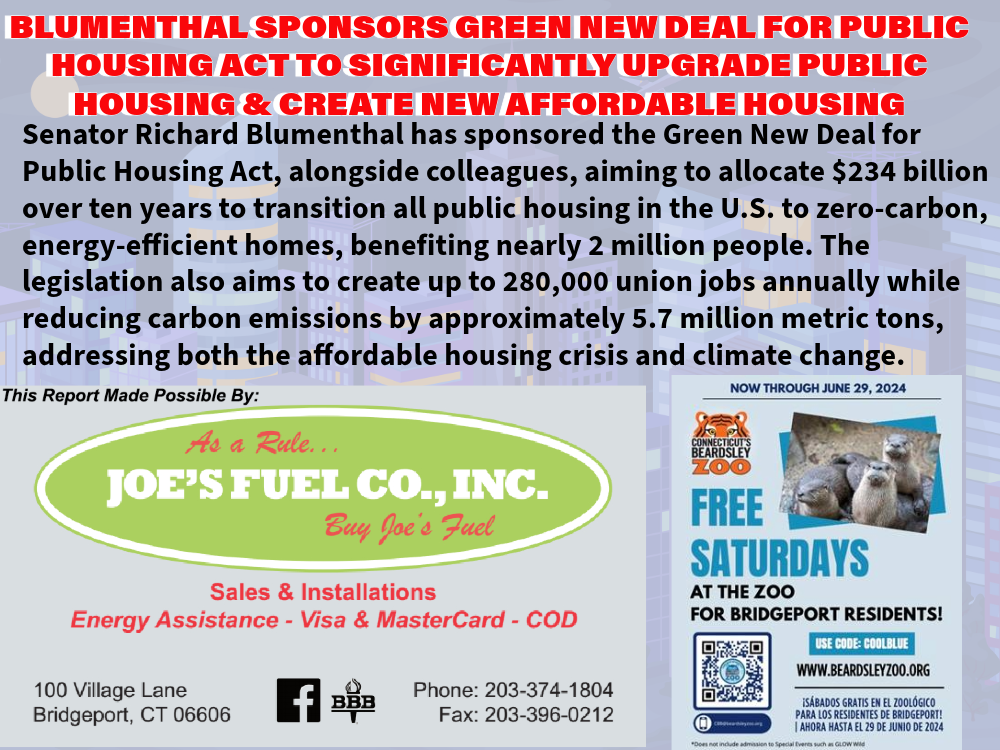
[HARTFORD, CT] – U.S. Senator Richard Blumenthal (D-CT) joined Senate colleagues in reintroducing legislation that would take on the affordable housing crisis and the existential threat of climate change. The Green New Deal for Public Housing Act invests up to $234 billion over ten years to transition the entire public housing stock in the United States into zero-carbon, highly energy-efficient homes – dramatically improving living conditions for nearly 2 million people in public housing across the country. The legislation also creates up to 280,000 good-paying, union jobs per year, while reducing annual carbon emissions by roughly 5.7 million metric tons – the equivalent of taking over 1.26 million cars off the road.
“We need to address both the climate and housing crisis through dramatic renovation, refitting, and construction of new housing for those who are without housing or are living in public housing that may be decades old,” said Blumenthal on Thursday at a press conference at the Wilmont Crossing in New Haven. “We must bring public housing into the 21st century through the Green New Deal for Public Housing, an investment of $234 billion a year over ten years. The effect on the climate crisis and housing crisis would be dramatic and historic if this is passed.”
Today, the U.S. faces a deepening climate and housing crisis, and public housing is burdened by government neglect, racial injustice, and chronic disrepair, including a $70 billion maintenance backlog. Residents of public housing often suffer worse health outcomes due to mold infestations, lead contamination, poor indoor air quality, and unsafe temperatures. Low-income households on average spend 8.6 percent of their total income on energy costs compared to 3 percent for other households – often forcing the choice between paying energy bills or other essential expenses like food, medicine, and child care.
Additionally, about 11.3 million American households are severely cost-burdened from paying more than 50 percent of their income on housing. Alarmingly, there are currently no states in the country where a full-time worker earning the federal minimum wage can afford a modest two-bedroom apartment.
With its focus on transforming over 900,000 units of public housing, the Green New Deal for Public Housing Act would take on the housing and climate crises in a number of ways including by:
- Repealing the Faircloth Amendment, which limits the construction of new public housing developments, an important step toward providing affordable housing for all.
- Ensuring all public housing is brought up to safe, sanitary, and sustainable conditions.
- Providing funding to electrify all public housing, add solar panels, and secure renewable energy sources for all public housing energy needs.
- Supporting families and sustainable communities by building new child care and senior centers, expanding access to clean transportation, and creating community gardens and other community investments.
- Expanding federal programs to provide residents with meaningful work investing in their own communities and facilitate resident-owned and operated businesses.
- Expanding resident councils so that public housing residents have a seat at the table for important decisions regarding their homes.
The Green New Deal for Public Housing Act is led by Senator Bernie Sanders (I-VT) in the Senate and by Representative Alexandria Ocasio-Cortez (D-NY) in the House of Representatives. The legislation is cosponsored by U.S. Senators Blumenthal, Cory Booker (D-NJ), Ed Markey (D-MA), Jeff Merkley (D-OR), Alex Padilla (D-CA), Elizabeth Warren (D-MA), and Peter Welch (D-VT), and 55 members in the House of Representatives.
The legislation is endorsed by more than 70 organizations including American Federation of State County and Municipal Employees (AFSCME), National Low Income Housing Coalition (NLIHC), National Housing Law Project, American Federation of Teachers (AFT), National Health Care for the Homeless Council, Center for Popular Democracy Action, National Homelessness Law Center, Movement For Black Lives, Alliance for Housing Justice, People’s Action/Homes Guarantee Campaign, MoveOn, National Domestic Workers Alliance, Care in Action, United Auto Workers (UAW) Region 9A, Green New Deal Network, Sunrise Movement, Public Citizen, NextGen America, Make The Road New York, and Care In Action.
